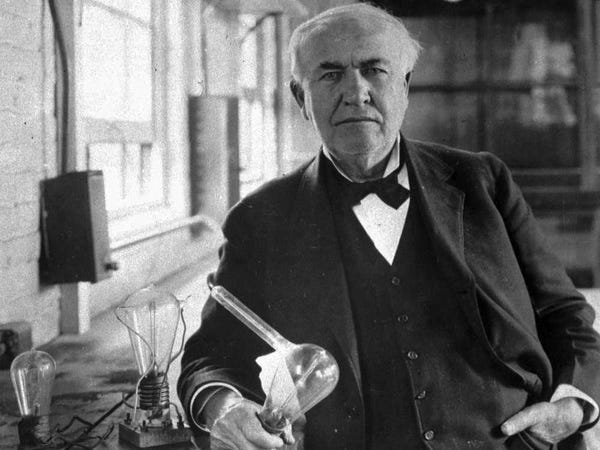In 1914, Thomas A. Edison’s vast plant in New Jersey caught fire which burned down equipment, wiped out ten buildings, and undid a lot of progress.
Something like this would have crushed many ordinary entrepreneurs. But Edison said, “Although I am over 67 years old I’ll start all over again tomorrow.” He didn’t let the incident pull him backward. His optimism is seen when he reframed the sight of the ghastly fire into a spectacle.
According to a 1961 Reader's Digest article by Edison's son Charles, Edison calmly walked over to him as he watched the fire destroy his dad's work. In a childlike voice, Edison told his 24-year-old son, "Go get your mother and all her friends. They'll never see a fire like this again." When Charles objected, Edison said, "It's all right. We've just got rid of a lot of rubbish."
Edison reframed a tragedy into a win.
Reframing is the act of giving a different meaning to a situation/outcome and of seeing it in a different light. It is one of those small things that can profoundly impact how we address issues, how we solve problems, and even how we live.
While it may be a small change, it may not be an easy one, and it will take a while to learn to reframe situations from negative to positive ones. Below we look at some examples of reframing.
Crisis/Failure → Lesson
“Everything happens for a reason” is a powerful quote that can make you stop despairing over failure and instead try to figure out its reason.
Marilyn Monroe said:
“I believe that everything happens for a reason. People change so that you can learn to let go, things go wrong so that you appreciate them when they’re right, you believe lies so you eventually learn to trust no one but yourself, and sometimes good things fall apart so better things can fall together.”
When I was young, my mom used to keep repeating something even potent: “everything happens for a good reason.” This is the view that Edison espoused when he was able to see his buildings burning down as getting rid of rubbish. No wonder he used to say “I have not failed. I've just found 10,000 ways that won't work.”
Have to → Get to
When you catch yourself thinking, “I have to do this,” try reframing it to “I get to do this!”
The thought process stops when you think “have to”, but it opens up when you think “get to”. You now try to figure out the reasons, presumably the good ones, to do something.
When your boss gives you extra work, you get to do it and learn more.
When someone bores you to death, you get to listen to them, to train your mind to focus better.
When you have to do chores, you get to organize your home.
Success/failure → Trying/growing
When you want to start a new venture, you can be apprehensive of the outcome: whether it will succeed or fail? That naturally gives you a pause since we are all wired to be loss-averse and don’t want failure. Instead of thinking in terms of success and failure, think in terms of trying and growing. I am reminded of this powerful excerpt from The Third Door by Alex Banayan:
I’d always seen success and failure as opposites, but now I could see they were just different results of the same thing—trying. I swore to myself that from now on I would be unattached to succeeding, and unattached to failing. Instead, I would be attached to trying, to growing.
In some sense, this is what ancient books like Bhagavad Gita tells us: do your duty since you have no control over the outcome.
When you reframe your quest to try and grow, you thrown away the hesitation out of the window.
Walking in somebody else’s shoes
When someone cuts us off on the road, our instantaneous reaction is one of rage and anger. But perhaps the other person was rushing to the hospital to take a loved one or simply didn’t see you?
When someone does something annoying/bad/hurtful or just dumb, you can reframe it to put yourselves in their shoes and to see what might have caused that to happen. It will bring empathy to the situation. But at the very least, you won’t be wasting your own time and energy by simmering in anger. When the person cuts you off, instead of spending the next five minutes in a dour mood, you can continue to focus on the road or the podcast you are listening to. That’s the smarter thing to do.
Upset with X→ Upset with the judgment of X
Relatedly, our emotion is often tied not to the incident itself, but to our own judgment of it. When the person cut you off, it was your (presumably incorrect) judgment of it that boils your blood.
When you are upset about something, reframe it to think that you are upset over the judgment of it. You will now wonder if the emotion is worth it or not.
The words we use
The words we use dictate how we think. Saying something is cheap has a very different meaning than saying something is inexpensive. Often, you can reframe a situation by using other words. A person is not rigid but probably systematic. They are not boring when they sleep at 10 pm sharp, but they are being consistent. Someone got duped? They are not naive but trusting. The list can go on and on.
Thank you for reading. If you liked this post, please share with your friends!




